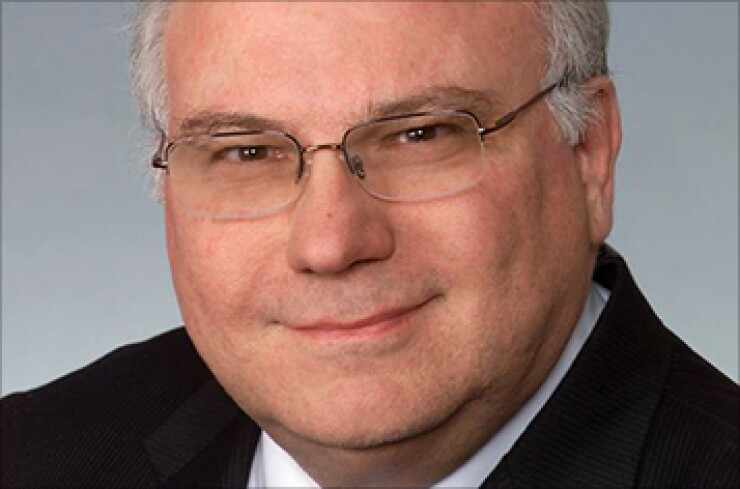
BRADENTON, Fla. — The highly rated Kentucky Bond Corp. pool bond program is helping Hillview fund a legal settlement negotiated after the city filed for bankruptcy.
The KBC, a conduit issuer sponsored by the Kentucky League of Cities, received two competitive bids for $5.7 million of revenue bonds Wednesday, and will close on the transaction June 1, according to financial advisor Ross Sinclaire & Associates LLC.
Hillview will use $5 million of the proceeds to pay a portion of what it has promised to settle the legal dispute that lead city leaders to file a Chapter 9 bankruptcy petition in August.
U.S. Bankruptcy Judge Alan C. Stout dismissed the bankruptcy petition May 9, after the small city south of Louisville and its legal antagonist, Truck America, filed a joint request for the case to be discharged.
Chicago-based Hutchinson Shockey Erley & Co. was the winning bidder on the KCB deal.
The bonds priced to yield 1.25% with a 3% coupon in 2018, 2.75% with a 3% coupon in 2028, and 3.37% with a 3.5% coupon in 2042.
Of the proceeds, $5.43 million will go to Hillview, with lease payments to the KBC through 2042, while $260,000 will go to the city of Frenchburg, which will make payments through 2029.
Dinsmore & Shohl is bond counsel.
The bonds are primarily secured by lease payments on loans to various public entities participating in the KBC's pool bond program, all of which carry a general obligation pledge. Revenues in debt service reserves also secure the debt.
Hillview officials did not respond to requests for comment about the bond issue or the settlement.
A positive factor underpinning the KBC transaction is that Hillview believes it has solved the bankruptcy with a settlement, and has a mechanism to pay for it, according to municipal restructuring expert James Spiotto, managing director of Chapman Strategic Advisors.
S&P Global Ratings rates the bonds AA-minus, based in part on the strong risk profile of KBC's overcollateralized bond program, S&P said in a May 4 report.
The rating also recognizes KBC's exceptionally low loan delinquencies since 1987, when the sponsor began offering lending programs to its members.
While the rating was based solely on the pool bond program, the POS for this week's deal disclosed that Hillview was a participant in the transaction.
The city's legal counsel has provided a letter to the KBC stating that the city "has the financial capability and intends to continue to make payments" under its lease, the POS said.
Hillview, which issued GO bonds under its own credit in 2010, also received a rating upgrade to BBB from B-minus from S&P after the settlement with Truck America was first announced on March 30.
Ross Sinclaire vice president Joe Lakofka said prior to pricing that he did not expect interest costs to be affected by the city's participation in the KBC offering.
"The deal will price similarly to how the Kentucky Bond Corp has priced deals in the past," Lakofka said Tuesday. "Given the affirmed rating from S&P of AA-minus, and the recent upgrade of the city of Hillview, there should be no reason for this issue to trade any differently than previous issues."
Wednesday's transaction achieved a net interest cost of 3.29%, according to Ross Sinclaire.
Since 2014, net interest costs on other KBC deals have ranged from a low of 2.94% to a high of 3.37%, according to bond sales reported on Thomson Municipal Market Monitor.
Spiotto had said the market's perception of Hillview's participation in the transaction would show in the interest rates.
In a negotiated deal, he said, the finance team can talk to banks and investors in advance of pricing and explain the transaction.
The KCB deal was sold competitively.
"Time will tell whether it is sustainable and affordable," he said, referring to the city's lease payments on the bonds and other settlement costs.
Hillview, a city of about 8,000 residents, is about 17 miles south of Louisville.
The city filed for Chapter 9 on Aug. 20 owing Truck America $15.23 million from a court-ordered judgment it lost over a soured legal dispute involving a contract to purchase city land.
In pre-petition negotiations, city officials turned the land over to the company, but later said that settlement could not be negotiated on the amount of the award.
After meeting with mediators during the bankruptcy case, Hillview agreed to a series of revenue-raising measures, including the issuance of $5 million of GO bonds to pay Truck America.
The city also promised to raise its occupational tax to 1.8% from the current rate of 1.5%, increase its insurance premium tax to 7% from 5%, and pay Truck America 8.3% of its "eligible revenue" each year for 20 years.
Stites & Harbison PLLC attorney Brian Meldrum, who represented Truck America, was unable to comment.
Meldrum previously said that the settlement was the result of "hard work on all sides," although he declined to comment on why his client accepted the settlement terms, which could result in a payment that is less than $15 million it is owed under the court judgment.
The agreed-upon-formula upon in the settlement could result in a discount to Hillview because its annual revenues will fluctuate even though the city will pay 8.3% of its eligible revenues to Truck America.
Still, rating agencies questioned whether the city could pay the debt over the long term.
Despite the upgrade to investment grade, S&P analyst Scott Nees said the rating incorporated "uncertainty" about the city's ability to handle the costs, in conjunction with other vulnerabilities.
Nees cited the city's high direct debt burden with annual carrying charges that will nearly double because of payments associated with the KBC bonds being issued this week.
S&P also said the city is vulnerable due to limited reserves and liquidity, elevated and rising pension costs, and the absence of formal and informal financial management policies.
"While we have emphasized our concerns regarding the pending settlement costs and their potential impact on the city's budget, we also note that Hillview's operating budget has been balanced for the past three audited fiscal years and the city has additional revenues coming in that should help offset the additional costs, factors which support a stable outlook," Nees said.
In May, Moody's said that settlement costs may prove unaffordable for the city.
"Escalating fixed costs with the settlement could challenge the city's financial and operational flexibility and require tax increases to remain solvent," said analyst Nathan Phelps. "Spending cuts, job growth or increasing property values could, however, provide relief."
Moody's estimated that Hillview would benefit from the settlement by reducing the amount it owes Truck America by approximately $5 million, a figure based on the city's fiscal 2015 eligible revenues and the GO bond proceeds.
However, the payments could significantly increase the city's fixed costs, Phelps said.
In 2015, the additional cash flow from the payments to Truck America would have increased the city's fixed costs to $1.3 million, or 41% of general fund revenues, said Moody's, which once rated the city's GOs.
By comparison, Hillview's current fixed costs, including debt service and pension contributions, were $558,000 in fiscal 2015, or 17.6% of revenues.
Moody's also said the settlement marks a missed opportunity to gain additional insight into whether a municipality facing a crushing legal decision can claim insolvency as a condition of filing for bankruptcy.
In Hillview's case, the bankruptcy court took testimony late last year to determine if the city was insolvent, although a ruling had not been issued by the time a settlement was reached.
Spiotto said he is not surprised that Hillview's bankruptcy case ended before preparing a plan of debt adjustment because the city chose to settle.
"About 24% of cases never get to a plan of debt adjustment," he said, adding that Hillview's case exemplifies that "Chapter 9 is the last resort."
Spiotto has said that other Chapter 9 filings have resulted from judgment awards, such as Boise County, Idaho, which filed a petition in 2011 after losing a court case that awarded a $4 million judgment plus $1.4 million in attorney's fees.
In Boise County's case, the bankruptcy court determined that the county of about 7,000 residents was not insolvent and had the funds to satisfy the judgment.
Unfortunately, Spiotto said, some cities and counties have viewed Chapter 9 as a mechanism to tell creditors to settle, "or else" they will try to use a bankruptcy filing to reduce a judgement.
But many cases have ended before conclusion, he said, because of the cost and stigma associated with bankruptcy, and its potential effect on bond ratings and future access to the capital markets.
"Some people often realize that Chapter 9 is worse than negotiating," Spiotto said.





